Key to Indomalayan Proceratium Species
The following key to workers is based on Baroni Urbani, C., de Andrade, M.L. (2003) The ant genus Proceratium in the extant and fossil record (Hymenoptera: Formicidae). Museo Regionale di Scienze Naturali, Monografie, 36, 1–492.
Proceratium williamsi occurs in this region but is not included in this key.
1
- Petiole with peduncle, convex or subconvex in profile. Anterior clypeal border strongly protruding anteriorly or at least medially triangular. Mandibular base without light macula. First gastral tergite without a clear macula visible in transparency posteriorly. Palp formula 3,2 or 4,3 . . . . . 2
- Petiole without peduncle, rectangular in profile. Anterior clypeal border straight or weakly concave, never protruding anteriorly. Base of the mandibles with a light macula. Palp formula 2,2. First gastral tergite with a light macula visible in transparency posteriorly . . . . . 6
2
return to couplet #1
- Sides of the propodeum with a developed spine. Propodeal lobes with a broad lamellaceous tooth only . . . . . 3
- Sides of the propodeum at most with a small tip, without a true spine. Propodeal lobes without broad lamellaceous tooth, at most with a lamella over the whole declivous face . . . . . 4
3
return to couplet #2
- First gastral tergite angulate on the curvature. Gaster entirely foveolate. Malaysia (Sarawak) . . . . . Proceratium foveolatum
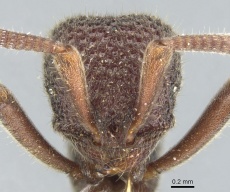 Head of Proceratium foveolatum worker |
 Profile of Proceratium foveolatum worker |
- First gastral tergite round on the curvature. Gaster at most punctate. Borneo, Brunei, Malaysia (Sabah and Sarawak), Thailand and Singapore . . . . . Proceratium deelemani
 Head of Proceratium deelemani worker |
 Profile of Proceratium deelemani worker |
4
return to couplet #2
- Frontal carinae fused. Clypeus strongly protruding anteriorly. Mesosoma, petiole, postpetiole and gaster foveolate. Malaysia (Sabah) . . . . . Proceratium microsculptum
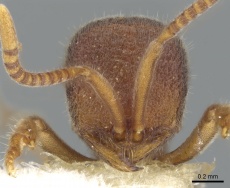 Head of Proceratium microsculptum worker |
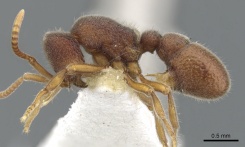 Profile of Proceratium microsculptum worker |
- Frontal carinae not touching each other. Clypeus reduced to a triangular tooth between the antenna1 sockets. Mesosoma, petiole and postpetiole granulate, gaster punctate . . . . . 5
5
return to couplet #4
- Body without long erect hairs. Propodeal sides at most with a narrow lamella. Hairs on mesobasitarsi shorter than 1/2 the mesobasitarsal length. Bhutan . . . . . Proceratium bhutanense
 Head of Proceratium bhutanense worker |
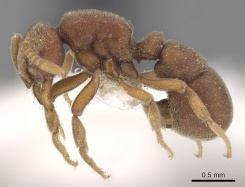 Profile of Proceratium bhutanense worker |
- Body with long erect hairs. Propodeal sides with a broad lamella over their whole length. Mesobasitarsi with hairs 1/2 the mesobasitarsal length. Malaysia (Pahang) . . . . . Proceratium malesianum
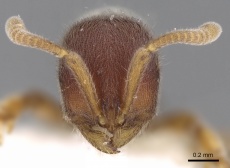 Head of Proceratium malesianum worker |
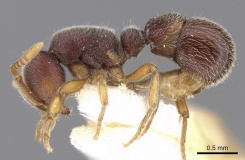 Profile of Proceratium malesianum worker |
6
return to couplet #1
- Postpetiole in dorsal view concave and laterally lobate. Posterior border of first gastral tergite folded. Head, mesosoma, petiole, postpetiole and gaster strongly sculptured. First gastral tergite with traces of longitudinal rugosities . . . . . 7
- Postpetiole in dorsal view neither concave nor laterally lobate. Posterior border of first gastral tergite not folded. Head, mesosoma, petiole, postpetiole and gaster less strongly sculptured. First gastral tergite without traces of longitudinal rugosities . . . . . 8
7
return to couplet #6
- Frontal area at least 1/3 of the head width. Sides of the propodeum with a small denticle. Rugosities on the first gastral tergite more irregular and thin (Fig. 146). SI < 65. Malaysia (Sarawak) . . . . . Proceratium angulinode
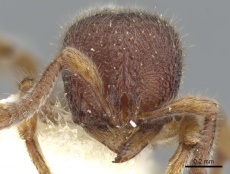 Head of Proceratium angulinode worker |
 Profile of Proceratium angulinode worker |
- Frontal area about 1/4 of the head width. Sides of the propodeum with a broad lamellaceous tooth. Rugosities on the first gastral tergite more regular and thicker (Fig. 147). SI >74. Malaysia (Sarawak) . . . . . Proceratium striativenter
8
return to couplet #6
- TL<2.65 mm. HbaL ≤ 0.24 mm. Papua New Guinea, Philippines, Sumatra, Malaysia, Sabah and Solomon Islands . . . . . Proceratium papuanum
 Head of Proceratium papuanum worker |
 Profile of Proceratium papuanum worker |
- TL ≥ 2.72 mm. HbaL > 0.27 mm . . . . . 9
9
return to couplet #8
- Hairs on the mid basitarsi never longer than ½ of the basitarsal length . . . . . 10
- Hairs on the mid basitarsi 2/3 of the basitarsal length . . . . . 12
10
return to couplet #9
- Mesosoma, petiole and postpetiole smooth or at most minutely punctate. SI > 69. Malaysia (Pahang) . . . . . Proceratium terraealtae
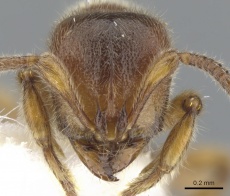 Head of Proceratium terraealtae worker |
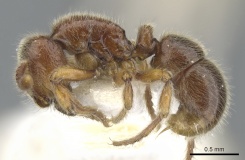 Profile of Proceratium terraealtae worker |
- Mesosoma, petiole and postpetiole densely granulopunctate. SI < 67 . . . . . 11
11
return to couplet #10
- Frontal area narrow and frontal carinae short (Fig. 129). Colour dark ferruginous. Malaysia (Sarawak) . . . . . Proceratium dayak
 Head of Proceratium dayak worker |
 Profile of Proceratium dayak worker |
- Frontal area broader and frontal carinae longer (Fig. 143). Colour yellowish to brown. Japan, Taiwan . . . . . Proceratium japonicum
 Head of Proceratium japonicum worker |
 Profile of Proceratium japonicum worker |
12
return to couplet #9
- Frontal area narrow, about ¼ of the maximum HW. CI < 92. SI > 68. Colour light brown. Thailand . . . . . Proceratium siamense
 Head of Proceratium siamense worker |
 Profile of Proceratium siamense worker |
- Frontal area broad, about 1/3 of the maximum HW. CI > 93. SI < 67. Colour ferruginous . . . . . 13
13
return to couplet #12
- Hairs of hind basitarsi at most ½ of the basitarsal length. CI > 98. Malaysia (Sarawak) . . . . . Proceratium sulawense
 Head of Proceratium sulawense worker |
 Profile of Proceratium sulawense worker |
- Hairs of hind basitarsi longer than ½ of the basitarsal length. CI < 97 . . . . . 14
14
return to couplet #13
- IGR 0.44. First gastral tergite convex (Fig. 148). Malaysia (Sabah) . . . . . Proceratium banjaranense
 Head of Proceratium banjaranense worker |
 Profile of Proceratium banjaranense worker |
- IGR ≥ 0.48. First gastral tergite less convex (Fig. 149). Malaysia (Sabah) . . . . . Proceratium dusun
 Head of Proceratium dusun worker |
 Profile of Proceratium dusun worker |